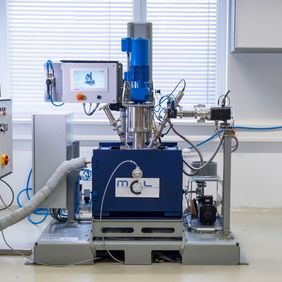Raw materials are necessary for the development of new innovations in the EU, especially for the development of eco-efficient and globally competitive technologies. The increasingly rapid technological innovation cycles and the rapid growth of emerging economies have led to a worldwide increase in demand for metals and minerals. The avoidance of critical raw materials is therefore becoming increasingly important for the production of metallic alloys.
Especially in aerospace, power generation and transportation (e.g. combustion processes in hydrogen-powered turbines, etc.), alloys that can permanently endure temperatures above 800°C in service are still in demand. However, there are only a small number of alloys that meet these requirements and the most common ones are based on nickel, cobalt, as well as refractory metals, which are very expensive and critical raw materials compared to iron.
At Materials Center Leoben, together with research partners from the Czech Academy of Sciences, a new iron-based alloy called FeAlOY (Fe-10Al-4Cr-4Y2O3) based on mechanical alloying has been developed and patented. Experiments on a laboratory basis (a few kg) have shown that the alloy, which contains no expensive nickel and only a little chromium, can match and even surpass nickel-based alloys on the market in terms of high-temperature resistance.
A recently launched IC-MPPE research project is now looking at making the time-consuming and therefore cost- and energy-intensive process of mechanical alloying (MA) more efficient, so that FeAlOY can also compete on manufacturing costs for larger volumes.
In order to improve the efficiency of mechanical alloying, the effect of cryogenic grinding temperatures on the new alloy is being investigated at Materials Center Leoben together with the Department of Mineral Processing at Montanuniversität Leoben. A specially developed prototype of a so-called attritor ball mill makes it possible to use liquid nitrogen as a cooling medium, while a high vacuum in the grinding chamber prevents atmospheric contamination. This allows the effect of low grinding temperatures on the processing of the FeAlOY to be studied in detail without drastically changing the alloy chemically.
Impact and effects
The mill design, as well as the experience gained with the process, will enable easier and optimized production of mechanically alloyed powders for new advanced alloys for elevated and high temperature applications.
Project coordination (Story)
Dr. Gerald Ressel
Gruppenleiter Steel Engineering
Materials Center Leoben Forschung GmbH
T +43 (0) 3842 45922-68
Gerald.Ressel(at)mcl.at
IC-MPPE / COMET-Zentrum
Materials Center Leoben Forschung GmbH
Roseggerstrasse 12
8700 Leoben
T +43 (0) 3842 45922-0
mclburo@mcl.at
www.mcl.at
Project partners
• Academy of Sciences of the Czech Republic
• Montanuniversität Leoben, Österreich




















